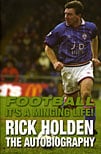 The Autobiography
The Autobiography
by Rick Holden
DB Publishing, £16.99
Reviewed by Dan Turner
From WSC 288 February 2011
A touchline-hugging, slaloming winger of the old school, Rick Holden brought a swagger to the teams he played for and a left peg capable of laser-guided crosses. Fans also loved his unusual reputation as both a footballing intellectual and all-purpose off-field loon. Read his autobiography and you'll quickly realise that this image is entirely based on fact.
The book starts with Holden's uncommon route into the game (he sabotaged his chances at Burnley by insisting on finishing his degree in Human Movement, before becoming Player of the Season at Halifax during his final year). It goes on to document his triumphs and failures, arguments and scrapes through stints at various clubs, including Watford, Man City and Blackpool. But it was at Oldham where he really came into his own – he was credited by manager Joe Royle as being the catalyst for the club's brief glory years. The book is equally generous in covering Holden's off-field roles, particularly at Barnsley and on the Isle of Man, where he was manager of Peel FC and the island's "national" team following retirement.
Rick is an entertaining bundle of curiosities. Thoughtful analyses of the role of alcohol in the British game, articulate rants about the inadequacies of the NHS and passionate defences of the Isle of Man battle for the soul of the book with stories of classic drunken antics and stomach-churning practical jokes.
There is a steady stream of factual errors which grates a little, especially as the author is also sometimes guilty of trying too hard to come across as the intellectual's footballer. But these are relatively small gripes. For instance, it's a very rare sporting autobiography indeed where an ex-pro can explain the exact technical composition of an Astroturf pitch and describe the gruesomely comic effects that playing on it has on the human body.
Holden doesn't care much for club directors and officials who he feels wield too much power without having sufficient knowledge of the game. Peter Swales's hatchet man John Maddocks at Man City, Barnsley chief Gordon Shepherd and an un-named female at Blackpool come in for particular tongue-lashings. Holden's a witty raconteur and there are plenty of laughs here. The general chaos of his time at Oakwell makes for a good read – he helps the club get promoted while simultaneously employed as assistant manager, first team coach, reserve team coach and physio. Special mention goes to the weekly boozy arguments he has with manager Paul Hart where he gets fired at the end of each night, only to be reinstated the following morning.
But there's a lot of sadness too. The death of his former team-mate Dave Longhurst on the pitch at York is a poignant moment, as are Holden's divorce from his wife (and mother of his children) and, especially, the end of his relationship with his fiancée. Typical of the madcap life story contained in this fine and honest book, his attempts to win her back go to pot when he kidnaps her dog in moment of madness.
It's a terrible title for a book. He didn't have much pace but he could bamboozle a full-back and was the best crosser I've ever seen. A bit like John Robertson. As a winger too, I idolised Rick Holden when he was at Oldham. What was also great about him was his timing of the cross – not dicking about until all the defence is back waiting for the cross, but getting it in as early as possible behind the defence. They ruined him at City by giving him balls to run onto instead of to his feet.
My favourite Tricky Ricky moment was in the FA Cup semi-final replay in 1990 against Man United. He was tackled by Mike Phelan, the ball going out for a throw. Holden picked up the ball, saw no team-mate, threw the ball at Phelan's back and took the ball on himself while Phelan was spinning round wondering what was happening.